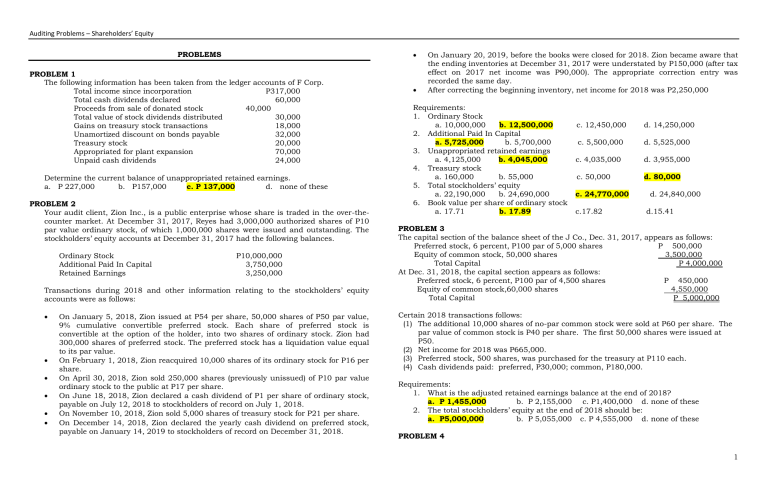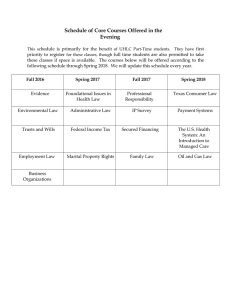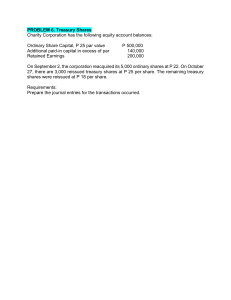pdfcoffee.com shareholders-equity-with-answers-pdf-free
advertisement

Auditing Problems – Shareholders’ Equity PROBLEMS PROBLEM 1 The following information has been taken from the ledger accounts of F Corp. Total income since incorporation P317,000 Total cash dividends declared 60,000 Proceeds from sale of donated stock 40,000 Total value of stock dividends distributed 30,000 Gains on treasury stock transactions 18,000 Unamortized discount on bonds payable 32,000 Treasury stock 20,000 Appropriated for plant expansion 70,000 Unpaid cash dividends 24,000 Determine the current balance of unappropriated retained earnings. a. P 227,000 b. P157,000 c. P 137,000 d. none of these PROBLEM 2 Your audit client, Zion Inc., is a public enterprise whose share is traded in the over-thecounter market. At December 31, 2017, Reyes had 3,000,000 authorized shares of P10 par value ordinary stock, of which 1,000,000 shares were issued and outstanding. The stockholders’ equity accounts at December 31, 2017 had the following balances. Ordinary Stock Additional Paid In Capital Retained Earnings P10,000,000 3,750,000 3,250,000 Transactions during 2018 and other information relating to the stockholders’ equity accounts were as follows: On January 5, 2018, Zion issued at P54 per share, 50,000 shares of P50 par value, 9% cumulative convertible preferred stock. Each share of preferred stock is convertible at the option of the holder, into two shares of ordinary stock. Zion had 300,000 shares of preferred stock. The preferred stock has a liquidation value equal to its par value. On February 1, 2018, Zion reacquired 10,000 shares of its ordinary stock for P16 per share. On April 30, 2018, Zion sold 250,000 shares (previously unissued) of P10 par value ordinary stock to the public at P17 per share. On June 18, 2018, Zion declared a cash dividend of P1 per share of ordinary stock, payable on July 12, 2018 to stockholders of record on July 1, 2018. On November 10, 2018, Zion sold 5,000 shares of treasury stock for P21 per share. On December 14, 2018, Zion declared the yearly cash dividend on preferred stock, payable on January 14, 2019 to stockholders of record on December 31, 2018. On January 20, 2019, before the books were closed for 2018. Zion became aware that the ending inventories at December 31, 2017 were understated by P150,000 (after tax effect on 2017 net income was P90,000). The appropriate correction entry was recorded the same day. After correcting the beginning inventory, net income for 2018 was P2,250,000 Requirements: 1. Ordinary Stock a. 10,000,000 b. 12,500,000 2. Additional Paid In Capital a. 5,725,000 b. 5,700,000 3. Unappropriated retained earnings a. 4,125,000 b. 4,045,000 4. Treasury stock a. 160,000 b. 55,000 5. Total stockholders’ equity a. 22,190,000 b. 24,690,000 6. Book value per share of ordinary stock a. 17.71 b. 17.89 c. 12,450,000 d. 14,250,000 c. 5,500,000 d. 5,525,000 c. 4,035,000 d. 3,955,000 c. 50,000 d. 80,000 c. 24,770,000 c.17.82 d. 24,840,000 d.15.41 PROBLEM 3 The capital section of the balance sheet of the J Co., Dec. 31, 2017, appears as follows: Preferred stock, 6 percent, P100 par of 5,000 shares P 500,000 Equity of common stock, 50,000 shares 3,500,000 Total Capital P 4,000,000 At Dec. 31, 2018, the capital section appears as follows: Preferred stock, 6 percent, P100 par of 4,500 shares P 450,000 Equity of common stock,60,000 shares 4,550,000 Total Capital P 5,000,000 Certain 2018 transactions follows: (1) The additional 10,000 shares of no-par common stock were sold at P60 per share. The par value of common stock is P40 per share. The first 50,000 shares were issued at P50. (2) Net income for 2018 was P665,000. (3) Preferred stock, 500 shares, was purchased for the treasury at P110 each. (4) Cash dividends paid: preferred, P30,000; common, P180,000. Requirements: 1. What is the adjusted retained earnings balance at the end of 2018? a. P 1,455,000 b. P 2,155,000 c. P1,400,000 d. none of these 2. The total stockholders’ equity at the end of 2018 should be: a. P5,000,000 b. P 5,055,000 c. P 4,555,000 d. none of these PROBLEM 4 1 Auditing Problems – Shareholders’ Equity SMDC Corporation was authorized at the beginning of 2017 with 300,000 authorized shares of P100, par value ordinary shares. At December 31, 2017, the shareholders’ equity section of SMDC was as follows: Share capital, par value P100 per share; authorized 300,000 shares; issued 30,000 shares Share premium Retained earnings Total shareholders’ equity P3,000,000 300,000 450,000 P3,750,000 On June 15, 2018, SMDC issued 50,000 ordinary shares for P6,000,000. A 5% share dividend was declared on September 30, 2018 and issued on November 10, 2018 to shareholders of record on October 31, 2018. Market value of ordinary share was P110 per share on declaration date. The profit of SMDC for the year ended December 31, 2018 was P475,000. During 2019, SMDC had the following transactions; Mar. 1 SMDC reacquired 3,000 shares of its ordinary shares for P95 per share. May 31 SMDC sold 1,500 treasury shares for P120 per share. Aug. 10 Issued to shareholders one right for each share held to purchase two additional ordinary shares for P125 per share. The rights expire on December 31, 2019. Sep. 15 25,000 rights were exercised when the market value of ordinary share was P130 per share. Oct. 31 40,000 rights were exercised when the market value of the ordinary share was P140 per share. PROBLEM 5 The shareholders’ equity section of the San Miguel Corporation’s balance sheet as of December 31, 2018 is presented below: 12% Preference share capital, P100 par Ordinary share capital, P20 par Share premium – preference Share premium – ordinary Share premium – treasury shares Retained earnings Total shareholders’ equity 1,585,840 P3,729,440 San Miguel had 65,000 ordinary shares as December 31, 2017. The following shareholders’ equity transactions were recorded in 2018 and 2019: 2018 May 1 July 1 Jul. 31 - Aug. 30 - Dec. 10 SMDC declared a cash dividend of P2 per share payable on January 5, 2020 to shareholders of record on December 31, 2019. Dec. 31 - Dec. 20 SMDC retired 1,000 treasury shares and reverted them to an unissued basis. On this date, the market value of the ordinary share was P150 per share. 2019 Feb. 1 May 1 May 31 - Dec. 31 Profit for 2019 was P500,000. Sep. 1 - Oct. 1 - Nov. 1 Dec. 31 - Based on the above and the result of your audit, determine the following as of December 31, 2019: 1. Share capital a. P21,400,000 b. P21,300,000 c. P14,800,000 d. P21,250,000 2. Share premium a. P4,627,500 b. P3,007,500 c. P4,632,500 d. P4,592,500 3. Total retained earnings a. P600,000 b. P565,000 c. P557,000 d. P560,000 4. Total equity a. P26,397,500 b. P25,932,500 c. P26,492,500 d. P26,445,000 P 270,000 1,598,400 36,800 235,200 3,200 Sold 9,000 ordinary shares for P24, par value P20. Sold 700 preference shares for P124, par value P100. Issued an 8% share dividend on ordinary shares. The market value of ordinary share was P30 per share. Declared cash dividends of 12% on preference shares and P3 per share on ordinary shares. Profit for the year amounted to P1,345,040. Sold 2,200 ordinary shares for P30. Sold 600 preference shares for P128. Issued a 2-for-1 split of ordinary shares. The par value of the ordinary share was reduced to P10 per share. Purchased 1,000 ordinary shares for P18 to be held as treasury shares. Declared cash dividends of 12% on preference shares and P4 per share on ordinary shares. Sold 1,000 shares of treasury shares for P22. Profit for the year amounted to P991,520. Determine the amounts, as required, in San Miguel Corporation’s comparative financial statements as of and for the years ended December 31, 2018 and 2019. 1. Total equity as of December 31, 2019 2 Auditing Problems – Shareholders’ Equity a. P4,175,200 b. P4,171,200 2. 3. c. P4,182,400 d. P4,157,200 Basic earnings per share for 2018 a. P17.12 b. P 8.21 c. P 8.56 d. P18.49 Basic earnings per share for 2019 a. P7.40 b. P7.34 c. P5.86 d. P5.81 PROBLEM 6 The Company adopted the following stock compensation plan for its employees. For each case, compute the amount of expense that should be recognized each year. CASE 1 In connection with a stock option plan for the benefit of key employees, the company intends to distribute treasury shares when the options are exercised. These shares were bought in 2015 at P42 per share. On January 1, 2016, the Company granted stock options for 100,000 shares at P38 per share as additional compensation for services to be rendered over the next three years. The options are exercisable during a 2-year period beginning January 1, 2019, by grantee still employed by the Company. Market price of the Company’s stock was P47 per share at the grant date. The fair value of the stock option is P12 on grant date. No stock options were terminated during 2016. 2016, 2017, and 2018 – P400,000 CASE 2 On January 1, 2017, the Company granted stock options to certain key employees as additional compensation. The options were for 100,000 shares of P2 par value ordinary stock at an option price of P15 per share. Market price of this stock on January 1, 2017, was P20 per share. The fair value of each stock option on January 1, 2017 is P8. The options were exercisable beginning January 1, 2017 and expire on December 31, 2018. On April 1, 2017, the Company’s stock was trading at P21 per share, all the options were exercised. 2017 – P800,000 CASE 3 Vesting condition – Three years of continued employment Assumptions: – 100 share options granted to each of the 1,000 employees on January 1, 2013 – FV of each share option is P30.00 – Exercise price is P120.00, par value of each share of stock is P100.00 • Actual and revised estimate of employees who leave the company • 2013 - 40 employees left, revised estimate is 50 of remaining employees will leave the entity • 2014 – 20 employees left; revised estimate is 40 of remaining employees will leave the entity • 2015 – 30 of the remaining employees left. 2013 – P910,000; 2014 – P890,000; 2015 – P930,000 • CASE 4 Vesting condition – Employees must remain in the entity’s employ during the vesting period – Shares will vest as follows: • End of 2017, if earnings increase by at least 18% • End of 2018, if earnings over two years increase by average of at least 13% • End of 2019, if earnings over three years increase by average of at least 10% –Assumptions: – 100 share options granted to each of the 1,000 employees on January 1, 2017 (total shares – 100,000) – FV of each share option is P30.00 • Actual and revised estimate of entity’s average earnings – End of 2017: actual- 14%; est. earnings in 2018- 14% – End of 2018: actual- 10%; est. earnings in 2019-6% – End of 2019: actual- 8% • Actual and estimate of employees who will leave the company – 2017 - 60 employees left, add’l employees to leave - 70 – 2018 – 50 employees left; add’l employees to leave - 30 – 2019 – 40 employees left PROBLEM 7 At the beginning of year 1, an entity grants to a senior executive 30,000 share options. The grant is conditional upon the executive remaining in the entity’s employ until the end of year 3. The share options can be exercised if the entity’s share price increases from P20 at the beginning of year 1 to above P30 at the end of year 3. If the share price is above P30 at the end of year 3, the share options can be exercised at any time during the next five years, i.e., by the end of year 8. The entity estimates the fair value of the share options on grant date to be P5 per option. This estimate takes into account the following market condition: 3 Auditing Problems – Shareholders’ Equity The possibility that the share price will exceed P30 at the end of year 3, i.e., the share options become exercisable; and The possibility that the share price will not exceed P30 at the end of year 3, i.e., the share options will be forfeited. The following actual events occurred in year 1 to 3: Year 1 Year 2 The share price has increased to P24. The entity’s estimate of the fair value of the options Is P4 at the end of year 1. This takes into account whether the market condition will be satisfied by the end of year 3. The share price has decreased to P22. However, the entity remains optimistic that the share price target will be met by the end of year 3. The estimated fair value of the share options is P3. Again, this estimate takes into account the market condition noted above. Year 3 issued and outstanding, 30,000 shares Share premium P 3,000,000 500,000 Market value of the ordinary share and bonds were as follows: Date Bonds Ordinary share January 1, 2018 118 40 December 31, 2018 106 42 Requirements: 1. How much of the proceeds from the issuance of convertible bonds should be allocated to equity? 231,672 2. How much is the carrying value of the payable as of December 31, 2017? 1,877,161 3. How much is the interest expense for the year 2018? 187,316 4. How much is the loss on bond reacquisition on December 31, 2018? 54,881 5. How much should be credited to APIC as a result of bond reacquisition? ? 37,918 6. How much will be credited to APIC from conversion of bonds? 350,239 The share price only reaches P28 by the end of year 3. The estimated fair value of the share options is zero, as the market condition has not been satisfied. Based on the preceding information, determine the following: 1. Compensation expense for year 1 A. P30,000 B. P40,000 C. P50,000 2. Compensation expense for year 2 A. P30,000 B. P40,000 C. P50,000 3. Compensation expense for year A. P0 B. P30,000 C. P40,000 4. Share options outstanding at the end of year 2 A. P70,000 B. P80,000 C. P90,000 5. Cumulative compensation expense for the three-year period A. P0 B. P70,000 C. P100,000 D. P60,000 D. P60,000 D. P50,000 D. P100,000 D. P150,000 PROBLEM 8 On January 2, 2017, the Bill Gates, Inc. issued P2,000,000 of 8% convertible bonds at 104. The bonds pay interest annually every January 1. The bond contract entitles the bondholders to receive 6 shares of P100 par value ordinary share in exchange for each P1,000 bond. On the date of issue, the prevailing market interest rate for similar debt without the conversion option is 10%. On December 31, 2018, the holders of the bonds with total face value of P1,000,000 exercised their conversion privilege. In addition, the company reacquired at 110, bonds with a face value of P500,000 The balances in the capital accounts as of December 31, 2017 were: Share capital, P100 par, authorized 50,000 shares, 4





